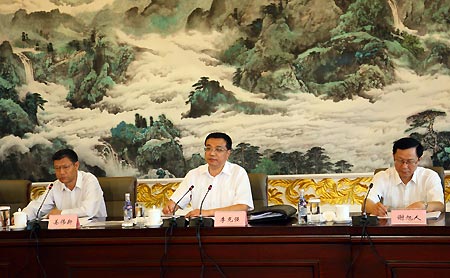Chinese Vice Premier Li Keqiang said over the weekend that the rebuilding of shanty towns which have long-housed low-income workers is an important part of the country's effort to improve people's livelihood.
|

|
|
Chinese Vice Premier Li Keqiang (C) addresses a meeting on the rebuiding of cities and hut zones, in Harbin, capital of northeast China's Heilongjiang Province.
|
Li made the comment at a working conference to address the rebuilding of shacks in cities and at compounds of large state-owned mining enterprises held in Harbin, capital of northeast China's Heilongjiang Province, on Saturday.
Such shanty towns are shabby residential areas that were built when the country started to industrialize its economy, and people living there are more often low-income wage earners in factories.
These people are either living in a space that is less than 10 square meters for each, or in apartments that have no tap water or sewers, or even toilets or kitchens.
China is aiming to offer proper housing for 7.5 million low-income urban households and 2.4 million households living in shanty towns of coal mines, reclamation areas, and forest zones in three years, Premier Wen Jiabao said in March.
There are another 1.14 million living in shabby apartments at compounds of state-owned mining enterprises, which are not included in the planning of cities, according to the conference.
Li urged to integrate the rebuilding of such shanty towns with the low-income housing project, initiated by the Chinese government to build affordable houses for low-income urban residents.
He also asked planners to build homes at different price levels in a region so as to avoid the concentration of poor population in a certain neighborhood.
Li stressed that the government should dominate the project of rehousing low-income workers, but it could invite funding from outside the government.
He said the government should secure land supplies for such projects and materialize tax supports.
The central government pledged to allocate 49.3 billion yuan (7.25 billion U.S. dollars) from the central budget to finance such housing projects in 2009 alone.